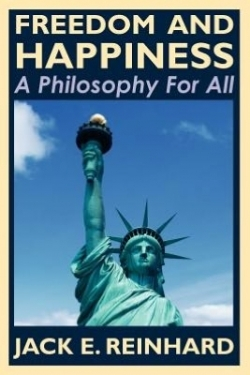Freedom and Happiness
A Philosophy for All
Newspapers are full of reports about the downfall of Social Security, growing unemployment, and the plummet of the real estate industry. Pessimists shake their head at the country’s decline and reminisce about “the good ol’ days.” In Freedom and Happiness: A Philosophy for All, Jack E. Reinhard takes an optimistic approach to facing the realities of today’s world. He explains what is needed to prevent further economic and spiritual decline from happening and asks readers to take responsibility for their own actions as well as hold government, legal, and business institutions accountable.
Reinhard seeks to give readers a common spiritual philosophy “to make this world a better place” and to “reduce individual confusion.” He urges people to take an active role in their lives and to understand that “happiness is not a right” but is the result of both “mental and physical actions.” Throughout the text, Reinhard asks his audience to evaluate decisions, to consider the environments where happiness is most attainable, and to act with intention to lessen the strife in the world.
With degrees in civil engineering and economics and thirty years of management experience in the utility business world, the author understands how to link key economic and business principles to a discussion of happiness, freedom, and the pursuit of knowledge and is able to take an interdisciplinary approach in creating his book’s philosophies. Reinhard is able to explain supply-and-demand charts in layman’s terms and the juxtaposition of such graphics alongside quotations from inspirational thinkers like Woodrow Wilson makes the book’s ideas easier to understand and endorse.
Freedom and Happiness explains the impact different institutions can have on individual and collective happiness in a clear and workman-like narrative that builds a strong case for the author’s philosophy. Reinhard discusses the role parents play in their children’s development and believes that the government and religion have currently taken on this role when people reach adulthood. As such, it is important for everyone to continually reconsider what they know—about the government, the economy, religious organizations—so that the world becomes a fair place where institutions and individuals are all held accountable for their actions.
Reinhard is direct when he shares his “philosophy for all.” His concrete and realistic approach to happiness provides readers with a clear framework for how to begin thinking about changing the world.
Reviewed by
Lisa Bower
Disclosure: This article is not an endorsement, but a review. The publisher of this book provided free copies of the book and paid a small fee to have their book reviewed by a professional reviewer. Foreword Reviews and Clarion Reviews make no guarantee that the publisher will receive a positive review. Foreword Magazine, Inc. is disclosing this in accordance with the Federal Trade Commission’s 16 CFR, Part 255.

